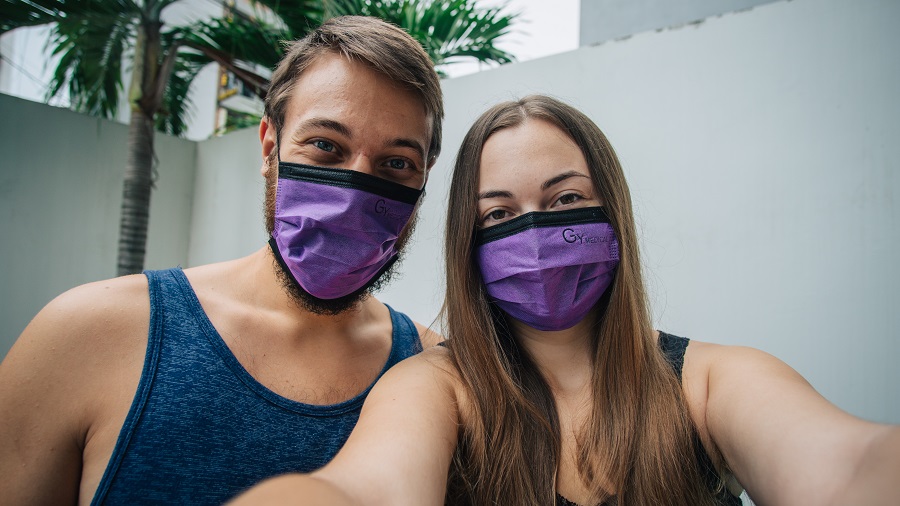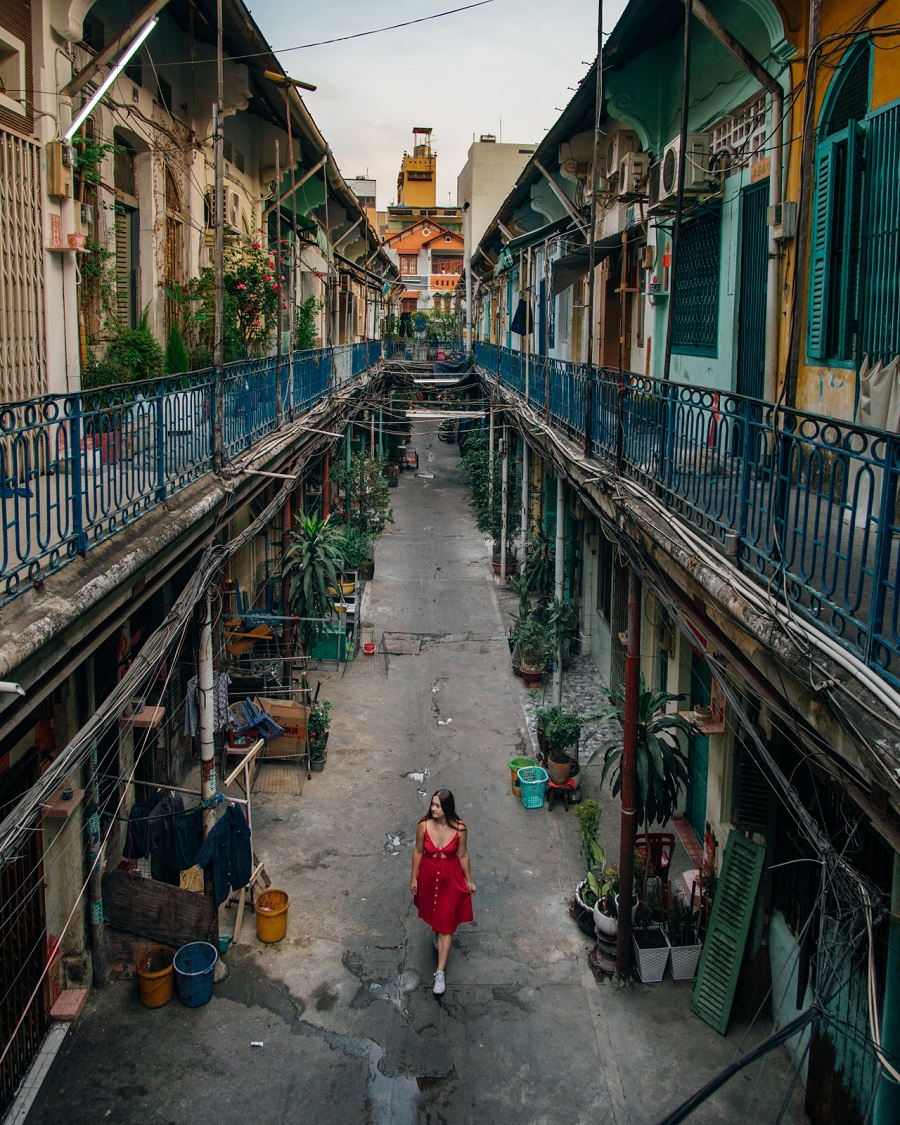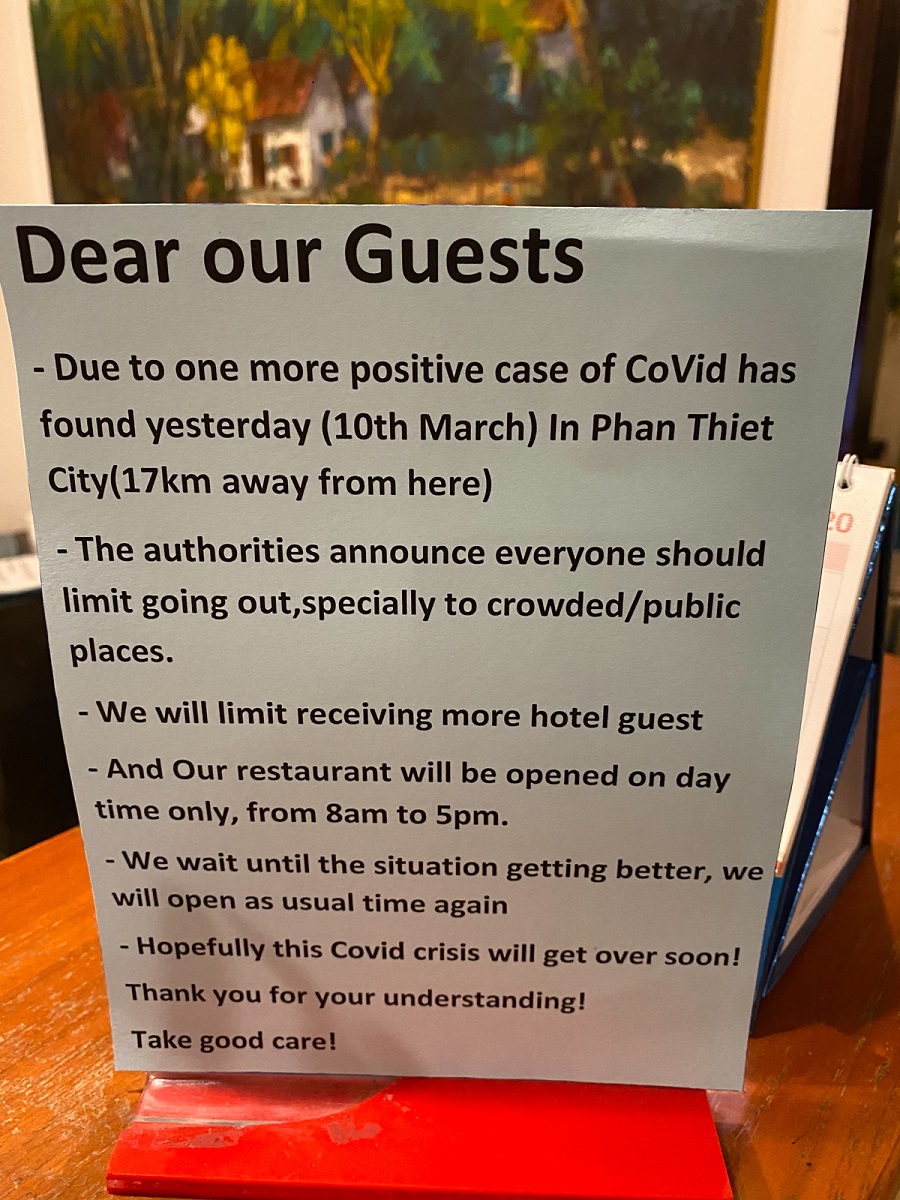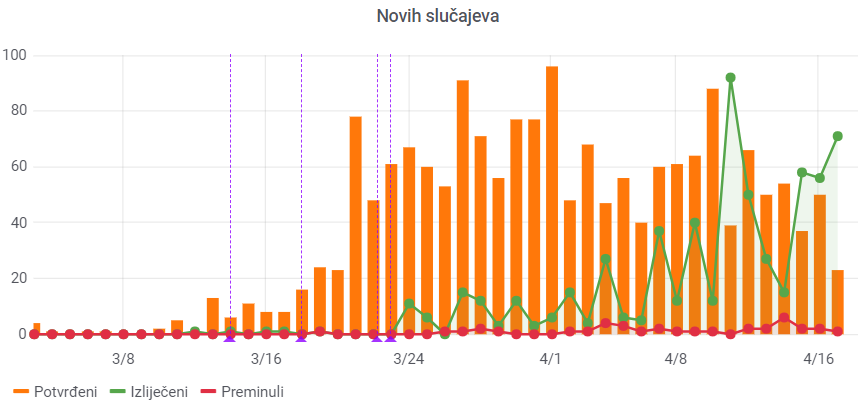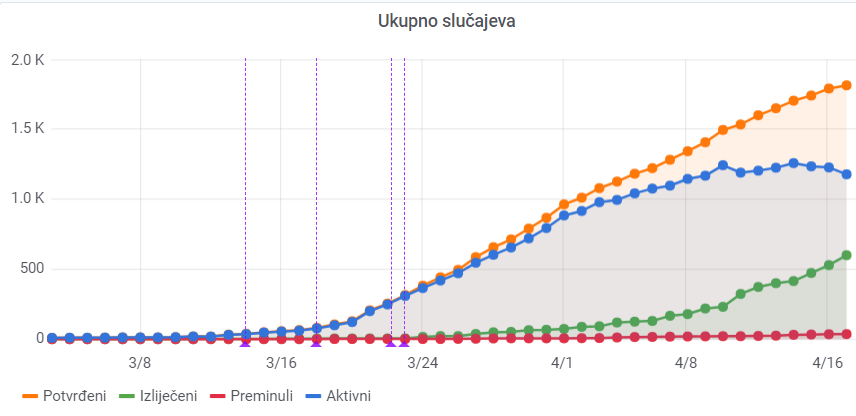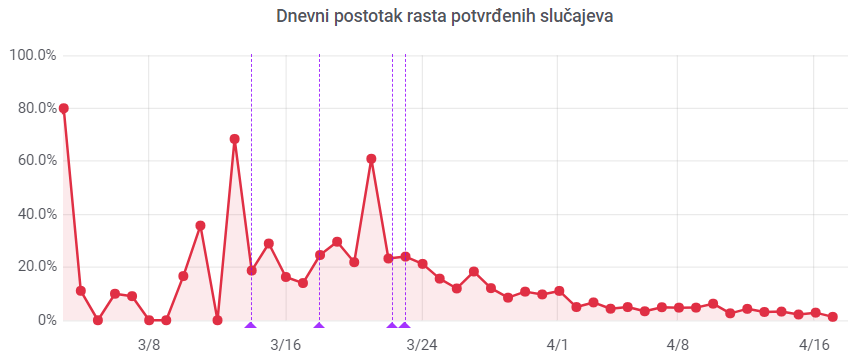Corona Voices in the Croatian Diaspora: Arijana from Ferdinandovac in Vietnam
April 18, 2020 - With as many Croatians living abroad as in the Homeland, what are the diaspora experiences of self-isolation? In the 8th of a new series, Corona Voices in the Croatian Diaspora, here is Arijana Tkalcec in Vietnam and originally from Ferdinandovac.
Last week TCN started a feature series called Foreigner Self-Isolation In Croatia: Do You Feel Safer? I can honestly say we have never had such a response or so many incredible contributions. The countries of origin of these expats in Croatia literally from all over the world. So far we have had submissions from expats from Romania, USA, Ireland, UK, Mexico, Argentina, Spain, Singapore, Holland, Canada, India, Hong Kong, Venezuela, Latvia, China, Honduras, Hungary, Moldova, New Zealand, Japan and Germany. You can see all their stories here.
Given the success of the series (still going strong) and large interest, it made sense to expand it to look at this from another angle - how Croatians abroad are coping where they are. If you would like to contribute your story to Corona Voices in the Croatian Diaspora, please find the submission guidelines below. Next up, Arijana Tkalcec in Vietnam and originally from Ferdinandovac.
I'm Arijana, a full-time traveler in the making. I got my masters in journalism but decided to go in a bit different direction from traditional journalism. Coming from Ferdinandovac, a small village in Croatia, I've always dreamt about exploring the world. My itchy travel feet don't let me stay in one location too long. Traveling is my passion, and I'm always on the lookout for new adventures (I especially love treks, waterfalls and van life). I'm a fan of slow travel, which enables me to experience the best of the country I'm in. I love learning about other cultures, getting to know locals, and visiting places without a need to rush.
If you want to follow my adventures, here is my Instagram page: @arijana.tkalcec (https://www.instagram.com/arijana.tkalcec/)
My website: https://shippedaway.com/
Firstly, how are you? Are you alone/with someone? Tell us a little about your situation and sanity levels.
Hello from Da Nang, a beautiful coastal city in Central Vietnam known for its sandy beaches. The city is also popular amongst digital nomads as it has everything needed for a normal life.
At the moment, I'm great, trying to make the most out of the current situation. It took some time to process what's actually happening, but it's all good now. However, I miss the adventure so much! I hate being closed inside.
I'm here with my boyfriend Matej (he's Slovenian), and our plan was to travel around South East Asia for seven months. First, we were in Bali for a month, and now we're willingly 'stuck' in Vietnam. I guess our trip is put on hold for a while. We're still sad about that as we had big plans, but we still hope the situation will get better soon so we can continue traveling.
When did you realise that corona was going to be a big issue?
When we started our journey in January, the coronavirus was already well known. But nobody saw it as a huge threat as it was still mainly in China. When we entered Vietnam on February 26th, there were 0 active cases (16 were reported previously, but all of them were cured). For about two weeks, we explored freely, and everything was normal. We were leaving Can Tho in Mekong Delta, heading towards a small coastal town Mui Ne, when the situation started to change. The cases in Europe began to rise insanely, and there were already reported cases in Croatia too. Vietnam right away started putting some restrictions on foreigners coming from high-risk areas.
When did you realise that corona was going to be a big issue in Vietnam in particular?
Around March 19th our hotel in Mui Ne put the notice about the new case reported 17 kilometers away from our town. That's when the situation here slowly started to change. Restaurants began closing down, hotels closed or had limitations about the number of tourists they were taking in, etc. But those were small changes, and we (as well as other tourists) weren't bothered with that. We continued our trip to Dalat, and there's where we realized that situation is way more serious than we thought. First of all, locals were scared of us as many new cases in Vietnam came from abroad (whether it's through foreigners or Vietnamese coming back from overseas). They would pull up the mask when we were passing by, we even got denied entry to one local restaurant, etc. It wasn't the most comfortable situation. Then masks became mandatory, Vietnam started closing borders, there was a massive cancellation of flights to Europe – it was evident that in the next few weeks/months won't be the most pleasant ones.
Give us a timeline on when and how life changed.
Considering the situation, in Dalat we had to make one of our most significant decisions yet: should we stay here or go home. It wasn't an easy decision for sure, and it took us the whole week to make the final decision to stay. Our families support that decision 100%, and they actually think we're safer here, so they wanted us to stay.
Why did we decide to stay? Firstly, flying in this situation didn't sound appealing to us. Many confirmed cases in Vietnam were connected to flights. Secondly, we already have our ticket back to Zagreb in September from Bali. This would be an additional financial cost that we couldn't afford. The tickets were too expensive, flights were getting canceled, many people got 'stuck' at airports, they had to buy multiple tickets because of the cancelations. It was too risky. Thirdly, if we did come back to Croatia, self-isolation of 14 days was mandatory. The only place we could go to was my parents' house, and that way we could put them at risk too. Lastly, the fact that my boyfriend is from Slovenia, which was already completely closed, made even more problems.
After our final decision to stay, we had to act fast. It was a matter of time when the country would go on lockdown, so we had to choose the place we want to 'get stuck in.' We chose Da Nang. To get there, we took a 6 hours bus to Nha Trang, where we stopped for a few days. The situation there was much different than Dalat. Everything was full of tourists (mostly Russians), many people didn't wear masks, the beach was full of people. We weren't sure what to think about that because the rest of the country was in a full-on panic, while here everything was so relaxed.
It took another 10 hours to reach Da Nang with the train. There was a shocking scene when we entered the Da Nang train station. People in full-on blue suits accompanied by police were waiting at the entrance. One guy held an English sign just for us as we were the only tourists on the train. I was so scared when I saw them as I didn't know what's going on. My first question was: 'What will they do to us?'. But I have to mention how kind and understanding they were. It made me much calmer. All of us went through a temperature check and hand disinfection (two times). As foreigners, we had to fill in some documents. There were questions about which places we visited, where we are staying, when did we enter Vietnam and how, etc.
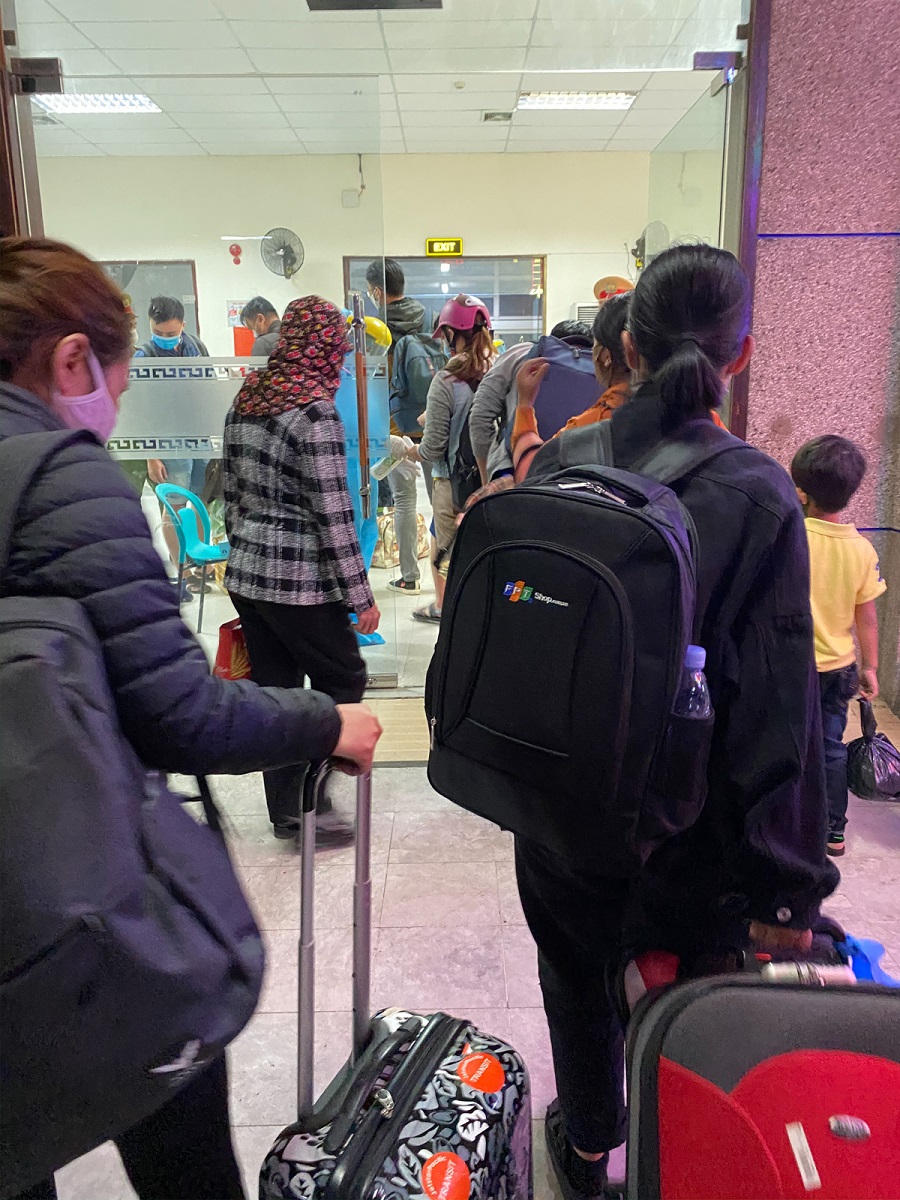
We also had to download their Health Declaration app and fill in our information. Every day the app asks us if we're feeling well or have any symptoms. That way, they can track how we are feeling. If anyone needs any help, they can react much faster than in other countries. Each person is identified with a certain number, which can be scanned through a QR code.
And now we're here. We came to Da Nang at the very last minute. The next day the city was closing down. We got lucky with finding accommodation because many didn't accept foreigners anymore. It was the government's order, so they stop the unnecessary movement.
Tell us about your day. Do you/can you leave your apartment?
The official lockdown (or social distancing measures - the official name they use) was from April 1st until the 15th, but now they extended it for another week. Although there's a huge possibility it will be extended again. We're advised to go out only if necessary, but you can go for a walk, exercise, etc. However, there are many restrictions, especially in the area where we are as it is considered a bit more touristic. The beach is closed. It's not possible to get near it as the police and lifeguards are patrolling the area.
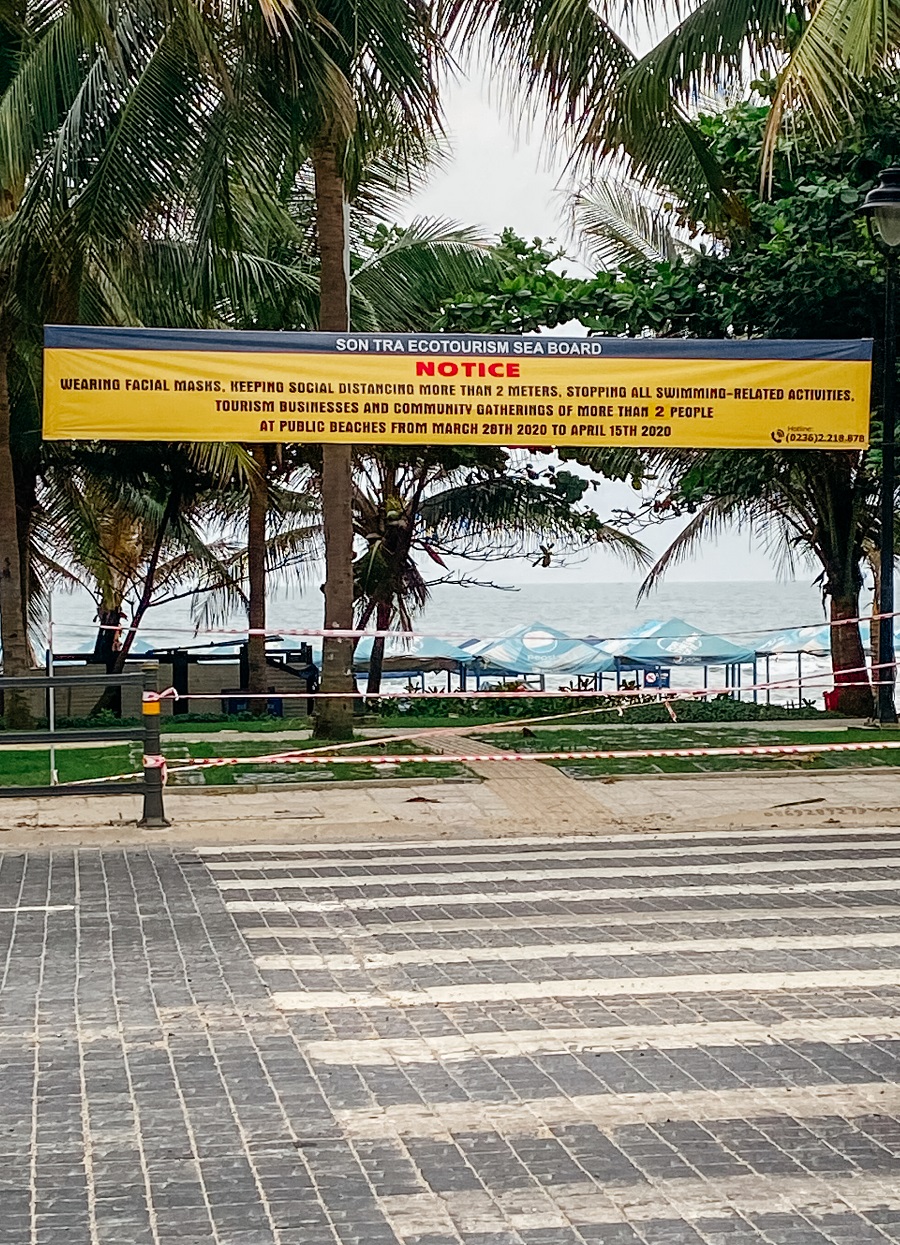
We don't go out much during the day as it's a bit annoying with all the restrictions, and it can be quite busy. That's why we go for night walks around 11 pm. Then we go to the beach because there's no police patrolling the area, and not that many people. Although more and more people started doing the same.
Other than that, we try to make some kind of routine. I finally started working out. This is also the perfect time for learning something new as there are many free webinars and courses about everything. I'm using this situation to improve my skills. There's always something to do. We're not bored at all.
How are the authorities doing at handling the situation?
I think they are doing pretty well. Many police officers are patrolling the area. You know what the rules are, and if you break them, they start whistling right away, letting you know you did something wrong. Other than that, there are fines too, so people are respecting the rules. Vietnam reacted very fast, put strict measures, and they are sticking to it. At the moment, they have only 67 active cases and 0 deaths. For now, we feel safe here.
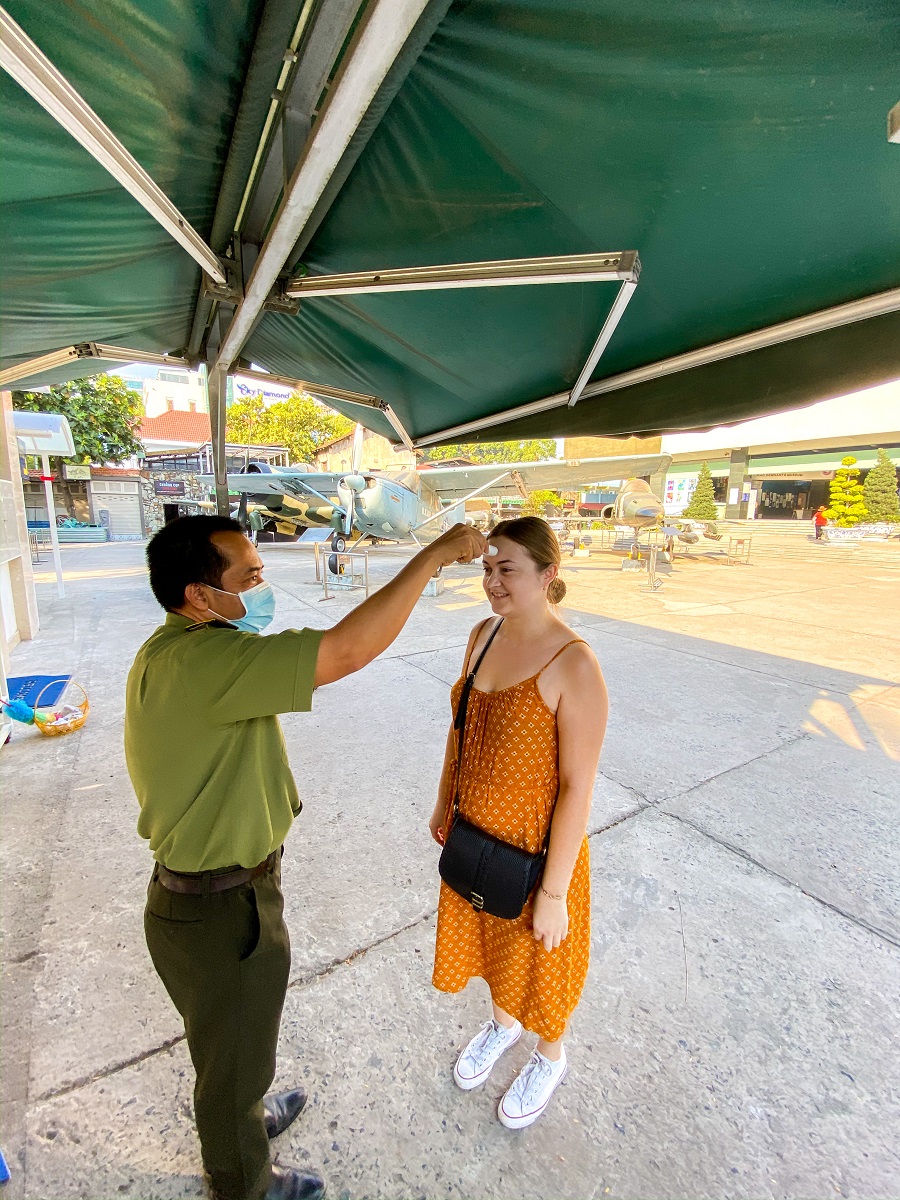
You obviously keep an eye on your homeland. What is your impression of the way Croatia is dealing with the crisis?
Honestly, I don't watch the news that much anymore. I quickly check the situation in Vietnam, so we stay up to date with any new regulations. It was stressing me too much, so I decided to cut that. :D
But when I still watched the news, the only thing I saw was people breaking self-isolation and putting others in danger. If the measures against that were stricter or people were better educated about the situation, I'm sure those cases would be rarer.
Compare and contrast the responses of Croatia and Vietnam. Who is doing what better?
I'm not that familiar with all the measures from both countries. Considering Croatia, I know what I hear from my family, and the thing I dislike a lot is not being able to move from one municipality to another. We know that Croatia has way too many municipalities aka 'općine', and now it is clear that they are entirely useless (it was clear even before but…). For example, my parents are living in the village, which is an 'općina' for itself, and they don't have any big grocery store there. Where to make that 'big shopping' then? The small local stores are so expensive (now even more), and they don't have fresh products. Sometimes, you can also find expired products (without a discount). They're not allowed to go to the small town nearby without a pass (I don't even want to comment on that), so many people in the same situation are having issues. Vietnam also has restricted movement across provinces, but those are much bigger areas, and that makes much more sense.
Also, I don't get how limited the working hours of the stores help. The workers are still exposed to people coming, so what difference does it make. Here the grocery stores work regular hours, which I find better as people spread more equally during those working hours. And people don't stack up on the groceries.
What about official communications from the authorities, compared to your home country?
I'm not sure how it is in Croatia, but here there are signs everywhere explaining social distancing measures. They even have audio coming from the speakers close to the beach explaining the rules. Signs and audio are both in English and Vietnamese. Every day they are sending messages reminding you to wash your hands and stay inside. Online taxi apps (like Grab, which is similar to our Uber) sends you notifications about measures and precautions too. Vietnam even made a viral song about coronavirus intending to educate its citizens. There is also a choreography with dances moves that show the right way of washing your hands. The conclusion is, both locals and foreigners are well informed about everything that's going on.
What's the one thing you wish you had taken with you into self-isolation?
This is a hard question. I don't feel like I miss anything at the moment. However, I wouldn't complain if we had a pool. I'm losing my tan and starting to look like a ghost again (I am very pale). Also, I wish I had more money for all the excellent tools, courses, etc. on huge discounts now. But there's just too many.
One thing you have learned about yourself and one thing you have learned about others during this crisis.
Once again, I learned how much I hate being stuck inside. I was a lot inside before this trip as I worked from home, and the reason we started this trip is for adventure and exploring. And now we're back doing the same. :D
I learned stressing too much about the situations you can't control won't be of any help. You'll just end up being unhappy. The best thing is going with the flow, solve one problem at a time, and adapt to the situation. The faster you adapt, the easier it gets.
In this crisis, you could see the worst and the best in people. Those two extremes were really seen now.
I also learned how bad situations connect people and how many are ready to help. I made some friends in all this mess as we all reached out to one another, trying to make the right decisions.
If you could be self-isolating in Croatia, where would it be, and why?
I don't have any specific location in mind. My go-to place would be the same for any country: some mountain cabin with a lot of nature and a lake nearby, an isolated spot so I could go out in nature whenever I want, without many people around.
Thanks, Arijana. Stay safe and see you on the other side. You can see all the stories in both this diaspora series, and the one on expats in Croatia on this link.
TCN is starting a new feature series on Croatian diaspora experiences of sitting out COVID-19 abroad and comparing your experiences to the situation in Croatia. If you would like to contribute, the questions are below. Please also include a para about yourself and where you are from, and a link to your website if you would like. Please also send 3-4 photos minimum to This email address is being protected from spambots. You need JavaScript enabled to view it. Subject Corona Diaspora
If you would be interested to record a video version for our partners www.rplus.video please let us know in the email. Thanks and stay safe.
Self-Isolation Voices from the Diaspora
Firstly, how are you? Are you alone/with someone? Tell us a little about your situation and sanity levels.
When did you realise that corona was going to be a big issue?
When did you realise that corona was going to be a big issue in New York in particular?
Give us a timeline on when and how life changed.
Tell us about your day. Do you/can you leave your apartment?
How are the authorities doing at handling the situation?
You obviously keep an eye on your homeland. What is your impression of the way Croatia is dealing with the crisis?
Compare and contrast the responses of Croatia and USA. Who is doing what better?
What about official communications from the authorities, compared to your home country?
What's the one thing you wish you had taken with you into self-isolation?
One thing you have learned about yourself, and one thing you have learned about others during this crisis.
If you could be self-isolating in Croatia, where would it be, and why?
TCN has recently become a partner in Robert Tomic Zuber's new R+ video channel, initially telling stories about corona experiences. You can see the first TCN contribution from this morning, my video from Jelsa talking about the realities of running a news portal in the corona era below. If you would like to also submit a video interview, please find Robert's guidelines below
VIDEO RECORDING GUIDE
The video footage should be recorded so that the cell phone is turned horizontally (landscape mode).
There are several rules for television and video news:- length is not a virtue- a picture speaks more than a thousand words
In short, this would mean that your story should not last more than 90 seconds and that everything you say in the report should be shown by video (for example, if you talk about empty streets, we should see those empty streets, etc.).
How to do it with your cell phone? First, use a selfie camera to record yourself telling your story for about a minute and a half. Ideally, it would be taken in the exterior, except in situations where you are reporting on things in the interior (quarantine, hospital, self-isolation, etc.). Also, when shooting, move freely, make sure everything is not static.
After you have recorded your report, you should capture footage that will tell your story with a picture, such as an earlier example with empty streets.
One of the basic rules of TV journalism is that the story is told in the same way as a journalist with his text. Therefore, we ask you for additional effort. Because we work in a very specific situation, sometimes you may not be able to capture footage for each sentence of the report. In this case, record the details on the streets: people walking, the main features of the city where you live, inscriptions on the windows related to the virus, etc.
The same rules apply if you are shooting a story from your apartment, self-isolation, quarantine. We also need you to capture footage that describes your story.
When shooting frames to cover your reports, it is important that you change the angle of the shot (in other words, shoot that empty street from several angles). Also, when shooting a detail, count at least five seconds before removing the camera to another detail.
The material should be about 5 minutes long (90 seconds of your report + frames to cover your story).
After recording everything, send us to Zagreb, preferably via WeTransfer to This email address is being protected from spambots. You need JavaScript enabled to view it.
Croatia to Start Serology Testing for COVID-19 Next Week
ZAGREB, April 18, 2020 - The head of the Croatian Institute of Public Health, Krunoslav Capak, said on Friday that the authorities would start conducting a serological survey next week to determine the prevalence of COVID-19 in the country.
Capak told the national broadcaster HTV that the performance of the survey should take 10 to 14 days so as to provide a wider insight in the situation.
Experts at the institute and at Zagreb's hospital for infectious diseases are making preparations for the testing so that they can establish how much serological tests would be reliable.
Serological surveys are often used by epidemiologists to determine the prevalence of a disease in a population. These surveys are sometimes performed at random, anonymous sampling from samples taken for other medical tests or to assess the prevalence of antibodies of a specific organism or protective titre of antibodies in a population.
Capak thinks that yet not enough number of Croatians are immune to this infection to provide for "collective protection" against this novel virus. However, this will change for the better later, according to his explanation.
More coronavirus news can be found in the Lifestyle section.
A 3 Video Tour of the Stari Grad Lockdown on the island of Hvar
April 18, 2020 - The first in a mini-series looking life on Hvar in the corona era. We start with a video tour of the Stari Grad lockdown.
Yesterday was a very strange day for me.
Since coming to Hvar a month ago - or is it longer? - my routine has been work, work, work and 30 minutes a day by the Adriatic each evening. I haven't been to the shops, haven't had a meaningful conversation with anyone in the flesh apart from the close family in my own self-isolation team.
As one of the only people to witness the incredible Za Krizen procession in Jelsa last week (if you want to know what it was REALLY like, read my eye-witness account through the night), I realised that this was a unique moment in time for the island (and the world) which was going largely undocumented. I also realised how many people love Hvar and would be heartened to see its current beauty to allow them to dream a little more of that next Hvar holiday.
So I applied to the Hvar police for a permit to travel to the ferry and walk around Stari Grad for my first assignment. As I said in my Za Krizen piece, the Hvar police and all the local authorities have been outstanding in their handling of this crisis and keeping us all safe. Thank you all. They were also kind enough to agree to my request. And so today we start with a little series documenting Hvar as it is at the moment, starting with a look at a Stari Grad lockdown close up.
A video tour of the riva yesterday afternoon.
A wander through those magical pedestrian streets in the old town. What an incredible feeling to have 2,400 years of history all to yourself.
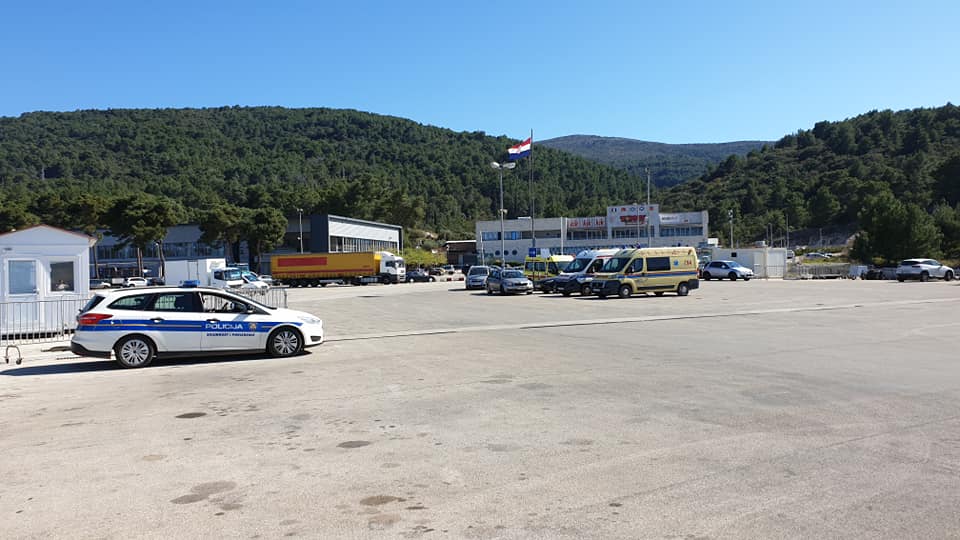
And I must mention the ferry. There will be a big TCN feature on what actually happens at the ferry, and how things are controlled, shortly.
But rest assured, the Hvar police and emergency services have everything under control. I witnessed the ferry arriving last night, and I was not only very impressed, but also very reassured by how seriously and professionally the authorities are working to keep us all safe.
And the final video for today - waiting for the ferry in the corona era.
To learn more about magical Stari Grad, here are 25 things to know for your next visit.
For the latest from the coronavirus crisis in Croatia, follow the dedicated TCN section.
Pet Centar Rewards Employees for Efforts in Pet Care in Coronavirus Era
As Poslovni Dnevnik/PD VL native tim writes on the 17th of April, 2020 over recent weeks, consumers have been increasingly shopping for pet food, Pet centar's new Buy and Pick up (Kupi i Pokupi) service has been introduced, and retail employees have received a 1,000 kuna bonus for their exceptional dedication and engagement during the coronavirus crisis.
Pursuant to the protection measures resulting from the coronavirus pandemic, stores across the Republic of Croatia have closed or have had to significantly adjust their business operations. We're witnessing part-time work, the increased use of online shopping and the increased use of delivery services. We aren't forgetting about our four-legged friends and other pets, and in order to provide them with the essentials they need, specialised retail chains such as Pet centar play a key role. According to a 2017 Gfk survey, Croats spend about six billion kuna annually on food, equipment and veterinary care for their pets, with an annual upward trend in spending of between five and six percent.
That is indeed the case, as evidenced by the intensive working weeks of Pet centar, whose activities are aimed at supplying and satisfying customers and their pets, even in these extraordinary circumstances. Key efforts were made by employees, which is why they were awarded a supplement of 1,000 kuna in March by a decision of the management board.
''I'm very proud that the Pet Network Group has such a dedicated team in times of crisis. The loyal and dedicated work of our employees is inspiring. We've reorganised more quickly than others, and our teams have been prepared and helpful to our customers in stores and on the webshop, keeping our offer stable while maintaining a sense of security because their workplace remains stable,'' said the Pet Network group's CEO Ljiljana Markov Medjugorac.
Safety comes first, and in addition to regular daily cleaning, in order to protect the health of both Pet centar employees and customers, multiple daily procedures for the disinfection of cash registers, baskets, POS machines, handrails and other surfaces, as well as the disinfection of sale, storage and office space were introduced. Disinfection points have been set up and companies who specialise in disinfection have been engaged.
"We're adhering to all of the regulations and instructions of the National Civil Protection Headquarters and, with the prescribed social distancing measures, we're also limiting the number of customers who can be present at the point of sale at the same time, and additionally protecting our employees at cash registers by installing Plexiglas protection," said Pet centar retail manager Neda Vuk.
Coronavirus-era shopping, at least when it comes to pets, has seen increased purchases for certain items. Over recent weeks, consumers have been increasingly shopping for pet food at Pet centar stores, as well as essential hygiene products, such as litter for cats. In the context of protection, Pet centar has also been seeing an increased demand for antiparasitics, which are essential veterinary medicinal products to protect the health of pets as well as that of their owners.
In order to adapt to the new coronavirus-induced circumstances, Pet centar has launched new services to assist with the supply of items for pets with minimised contact involved, including Buy and Pick up (Kupi i Pokupi), a contactless online order picking service in their stores. Live chat is also available to help less experienced shoppers make online purchases.
''This has proven that we can respond quickly and adapt to the new situation and direct our organisation to further meet customer needs. We're planning on introducing additional services and upgrading our existing ones to make it easier for our customers to make purchases,'' added Mirela Vujaklija, Pet centar's director.
Follow our dedicated section for all you need to know about coronavirus in Croatia.
Minister Beros: Relaxing Coronavirus Measures Depends on 5 Elements
The coronavirus measures that we've all now become used to are constantly being questioned by many. The weather is improving, the leaves have turned green and the sun is gradually beginning to shine with more strength and vigor.
With people's feet itching at the first signs of warmer, more stable weather approaching, the possibility of relaxing the Croatian Government's stringent anti-epidemic measures are being discussed more and more frequently, and in some circles - with increasing levels of frustration.
As Poslovni Dnevnik writes on the 17th of April, 2020, Croatian Health Minister Vili Beros, who has become a household name since the beginning of the pandemic in Croatia, along with other members of the National Civil Protection Headquarters, paid a visit to the continental Croatian county of Krapina-Zagorje, not too far from Zagreb. A press conference was organised at the very end of the visit.
Health Minister Beros answered, among other things, a journalist's question about the possibility of loosening the strict anti-epidemic measures still in place to attempt to prevent the spread of the new coronavirus, COVID-19.
''The defense strategy [against coronavirus] is based on five elements, and the exit strategy depends solely on the epidemiological situation, not just the number of patients we have in one day, but a number of other elements, too.
The exit strategy and [what things will look like] when we loosen the measures are ready. It's important that remain very careful. There is the possibility of decentralisation, that is, that we start with the relaxing of these measures first in the counties that aren't significantly affected by the infection,'' stated Minister Beros, as was reported by N1 Hrvatska.
Make sure to follow our dedicated section for all you need to know about coronavirus in Croatia. For long and interesting texts by eminent Croatian scientist Igor Rudan, follow this page.
Andrija Silences Conspiracy Theorists, Explains Information it Collects
As Poslovni Dnevnik/Bernard Ivezic writes on the 17th of April, 2020, Andrija, the new government service, is the first government service for which a Privacy Policy has been published, which sets somewhat of a precedent.
Andrija.ai, the world's first digital consultant to handle cases of suspected coronavirus infection, has decided to end the babbling of conspiracy theorists and has published its very own Privacy Policy.
For the past three days, all sorts of eyebrow-raising conspiracy theories about the new service have been circulating, claiming that through this service, the Croatian Government wants to ''spy on citizens'' through artificial intelligence, that it wants to encourage citizens to disclose the health status of their household members, and more.
The government of course denied it, but now it has gone one step further in silencing conspiracy theorists.
Andrija is, as stated, the very first government service to have a Privacy Policy, that is, a legally binding document that defines how data is managed on the Andrija.ai service. The Croatian Government has not implemented any public-private partnership in this way before and therefore has not ever had to face the situation of having to publish a Privacy Policy for some of its services.
The system, we recall, was created owing to the collaboration of the Ministry of Health and four private companies. The Croatian AI startup Mindsmiths, in collaboration with an epidemiology team led by Branko Kolaric, created an expert system that manages Andrija. Croatia's largest software company, Infobip, has linked Andrija and WhatsApp via its global communications platform to make it easily accessible to as many users as possible, and Neos, a partner of Oracle, has made sure Andrija has robust enough technology for it to be able to ''chat'' to four million Croatian citizens.
Mislav Malenica, CEO of Mindsmiths and president of the CroAI's Artificial Intelligence Association, says that it is now clear that the data processing manager, the one with whom people are engaging when using Andrija, is the Ministry of Health. He added that in addition to the ministry, companies that created and maintained the system themselves also have access to Andrija. These are the Croatian companies Mindsmiths and Neos.
"The executors who have access at the moment are Mindsmiths, which ensures that Andrija is working properly, and Neos, which prepares data for analysis at the Ministry of Health," explained Malenica. He added that the most sensitive information Andrija collects is the user's mobile number. However, this information is clarified for the sole purpose of the user being able to communicate with Andrija.
"In order for Andrija to respond, he has to send a message to a phone number. If the user doesn't use Andrija for more than three months, the phone number will be deleted because it will be considered that the user no longer needs to use Andrija,'' said Malenica.
He also clarified that Andrija doesn't require information on the health status of the beneficiary or of the other members of their household, and it neither stores nor collects additional identifiers on the basis of which household members can be identified. Additionally, if a user voluntarily shares their location with Andrija, this information isn't used in identifying the user, such as searching for his or her home address. Moreover, the point of this is, it follows from Andrija's Privacy Policy, is that epidemiologists can evaluate in which area, such as Zagreb, Split or Lika, certain symptoms occur and how often they occur, as this may indicate to them in what part of Croatia there is a possibility that the development of a new focal point may occur.
Malenica explained that through communication, Andrija collects information such as: general household information, general household member information, a rough household location, personal opinions and the user's personal opinions on their own state of health. This all happens on a voluntary basis. The narrower location is being obtained because analysis experts don't require high precision; they do calculations at the municipal or regional level, thereby reducing the potential for abuse.
In addition, Andrija's Privacy Policy clearly defines that users may request that their information be deleted.
If the user doesn't make that request, after three months, the system deletes any identification data, such as phone numbers, and anonymises the data so that no further processing can result in any subsequent processing of the user's identity. It is standard practice across a range of industries, and so far, this practice has proven to be completely safe for users. Thus, the data left by users is no longer personal data, but rather represents an anonymised data set, ie a database, on the state of Croatia at the time of the coronavirus, which, for example, will allow epidemiologists to analyse how to better manage a future pandemic.
Andrija is something special, because the state was not obliged to publish Privacy Policies up until the creation of this public-private partnership. Namely, the state has the power to legislate. This is, therefore, the first time that in a service offered by the state, citizens have the power to decide for themselves on their personal data.
Make sure to follow our dedicated section for more on coronavirus in Croatia.
Croatian Ministers Devise Plan to Restart Economy: An Overview of Activities
April 18, 2020 - The restrictive measures currently in place because of the coronavirus pandemic will expire at midnight on Sunday. Prime Minister Andrej Plenkovic has thus asked Croatian ministers to prepare an overview of economic activities to restart the economy, after which epidemiologists will make recommendations on how to comply with the measures.
"Most epidemiological measures expire at midnight on Sunday, and we will certainly extend most of these measures. But we are definitely moving towards a phase where certain measures will come to an end," said Chief of the National Civil Protection Headquarters and Minister of the Interior, Davor Bozinovic, on Friday for Jutarnji List.
He reiterated that Prime Minister Andrej Plenkovic asked all Croatian ministers to prepare an overview of economic activities to restart the economy, after which epidemiologists would make recommendations on how to organize compliance.
Next week, therefore, the Government will discuss proposed measures to unlock the Croatian economy after restrictive measures to curb the coronavirus pandemic have been in place for almost a month.
The most anticipated relaxation measures are certainly those regarding tourism, especially given the pressure from some of our foreign markets, which would love to spend the summer in the Adriatic this year. In this regard, for the sake of domestic guests, it is proposed to open intercity traffic and then the borders towards our auto destinations, which, in the case of a good epidemiological picture, could have some visitors this year.
"It is important that the conditions of border crossings are as simple as possible because if people have to wait in traffic and fill in paperwork, this is not appropriate either in health or in tourist terms," said the Jutarnji List interlocutors. When it comes to accommodation, it is suggested to open those closest to nature - primarily campsites - and begin with a segment of mobile homes with their own toilets so that guests do not mix often, and holiday homes and private renters will be open.
There are high hopes in nautical tourism, more precisely, the charter segment, which should also come to life among the first, because it was concluded that it could provide epidemiological conditions. It is also suggested to open cafes and restaurants, but to begin, only those who have terraces and who can provide sufficient distance between tables and guests.
Regarding the transport sector, Minister Oleg Butkovic will propose the introduction of the Zadar - Ancona catamaran line for freight, the gradual introduction of public transport in cities on a Sunday timetable, and the suburban railway around Zagreb gradually opening up under the same rule. The ministry is likely to suggest that, as in other European countries, trucking is carried out unaccompanied by police escorts along established corridors, and stopping would be allowed at predetermined areas.
Consideration is also being given to reducing the amount of tolls for Croatian citizens from 10 to 20 percent, the possibility of opening air routes within Croatia and relaxing travel arrangements to the islands.
Construction will certainly be one of the key branches of the economy this crisis year, and the Ministry has propsed three measures: accelerated digitization for obtaining all permits, faster flow of supplying construction materials, opening shops with construction materials, and solving problems with foreign labor power.
The Ministry of Agriculture proposes to pay HRK 350 million in incentives to the forestry industry for export, the same amount of incentives to the food industry with more than 250 employees, and to pay the first and second installment of the incentive for spring sowing.
The Ministry of the Economy will propose the gradual opening of non-food stores, with more models being discussed based on other European countries. Specifically, some countries have begun to open smaller stores as space is concerned, however, some activities are not as risky, even though they have large retail outlets, such as car dealerships, in which the daily flow of customers is low.
Consideration is also given to opening various trades, such as hairdressers, beauty salons, and massage parlors, with strict measures of distance, limiting the number of customers and wearing masks. For example, if a hair salon has four chairs, two customers will likely be able to stay at the same time. There will also be various services, tech stores, watchmakers, carpenters - all where there is no physical contact and where there is little flow of people. The opening of gyms and fitness centers is still pending.
In the cultural sector, the proposal will be to open bookstores. In the education and science system, one of the first measures to be relaxed will be to open scientific institutes and research laboratories, which should start working from the end of April in an appropriate form. As for returning to the classrooms of elementary and high school students, these decisions are entirely dependent on the assessments of the Headquarters and epidemiologists, so there are no specific dates.
However, it is suggested that final and diploma exams may still be taken in schools and colleges, especially where it is necessary to test the practical skills of students. The State Matura exam is likely to be written in June, and Minister Blazenka Divjak announced on Friday that the mandatory exams - Croatian and foreign language and mathematics - would be written from June 8 to June 29 in this case.
When it comes to the judiciary, the pace of relaxation of restrictive measures also depends on others - a prerequisite for discussions to begin is the resumption of public transport. If there is no transportation, it is pointless to invite the parties to court.
Another factor, says Justice Minister Drazen Bosnjakovic, is limiting the number of people who can stay in one room at the same time, and the sheer size of the courtrooms that are miniature in many courts, which is now being addressed by space allocation. To ensure that the work of the courts does not depend solely on loosening restrictions, the Ministry of Justice is developing a system of distance hearings.
This is in the wake of a request by the Croatian Bar Association to have hearings in civil cases via video link.
Minister Bosnjakovic says that it is necessary to see if the courts have computers with cameras and to check whether any legal interventions are required.
All courts were instructed to prepare larger premises in which trials could be held in compliance with spacing measures.
You can see the overview of economic activities below:
1. Public transportation according to Sunday timetable
It is proposed to open public transport and suburban rail according to the Sunday timetable, catamaran transport for cargoes between Ancona and Zadar, air transport within the country and relaxing measures towards the islands.
2. Opening borders for cars
It is proposed to open the borders to our auto destinations, which guests and tourists could come from, and the Ministry of Tourism believes that the conditions of crossing the border should be as simple as possible to avoid waiting in traffic.
3. Camps first to open
In the tourism sector, it is proposed to start first with the objects closest to nature - camps, i.e., mobile homes with their own sanitary facilities, then private accommodation and holiday homes. There is also nautical tourism.
4. Cafes with terraces start to work
It is also proposed to open cafes and restaurants, but to begin with, only those catering establishments that have terraces and can provide sufficient physical distance between the tables and the guests present would start.
5. Hairdressers will have to wear masks
The Ministry of the Economy is also moving towards relaxing small craft measures. Hairdressers and other salons could work concerning all measures of distance, with increased hygiene, limiting the number of customers and wearing protective masks.
6. New rules for crafts and showrooms
There are also plans to open other stores, such as technicians, watchmaking and carpentry shops, various repair shops, but also showrooms, where there is a slower daily flow of customers. Fitness centers and gyms are yet to be considered.
7. Taking exams at universities
Science institutes and research laboratories will first open in the education system - from the end of April. It is suggested that the final and graduate exams be taken in schools and universities, and the state matura exam will be taken in June.
8. Solving problems with foreign labor
It is proposed to urgently amend the acts for the digitalization of the licensing system, the faster flow of construction materials, opening all shops with construction materials, and the solution of problems of foreign workers at construction sites.
9. Bookstores first to open in culture
The Ministry of Culture will propose to open bookstores in consultation with clerks, and say they are in contact with other stakeholders in the culture to suggest what is realistic and what can be realized in a situation of prolonged restrictions.
10. Court hearings via video link
The Ministry of Justice is developing a system of remote court hearings via video link. All courts were also instructed to prepare larger premises where trials could be held, with due regard for physical distance measures.
Follow TCN's live updates on the coronavirus crisis
Corona Charts of Hope in Croatia, as Recoveries Outstrip New Cases for 3rd Day
April 18, 2020 - As more detailed corona charts and stats become available in Croatia, so too some rather encouraging trends.
It is just 40 days - and yet several lifetimes ago - since TCN produced the first corona map of Croatia on March 9, 2020.
I like to look at it from time to time - things didn't seem too bad back then, did they?
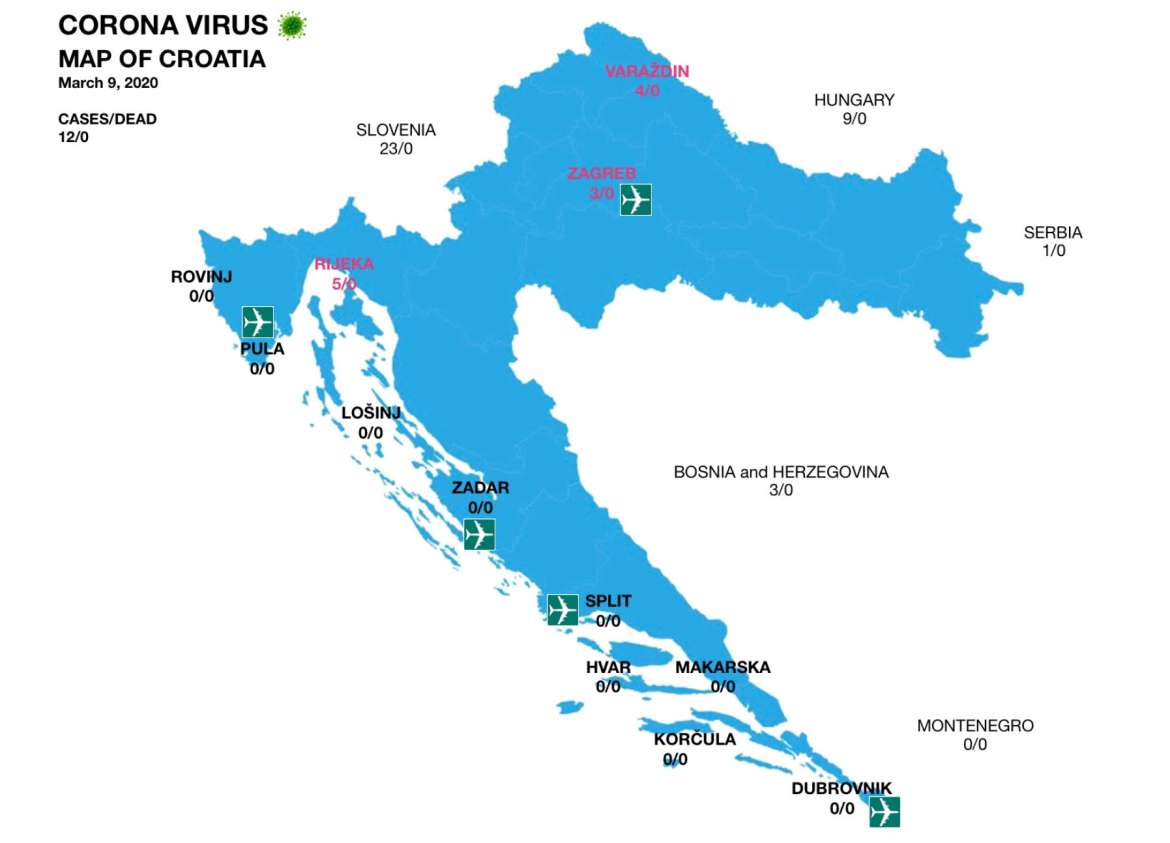
The response was huge, and it is the second-most popular article on TCN this year after the Zagreb earthquake.
And, as with most of the good stuff on TCN, the first corona map of Croatia had nothing to do with me.
"You know what is hot right now?" asked my clever Venezuelan colleague, Gustavo Vilera. "Corona maps. People want to see where the cases are. There is no corona map of Croatia."
Since I have no idea how to add text to a picture, the likelihood of me designing a corona map was less than zero, but my wife is much better at these things and most other things as well.
Working on her iPad and without any sophisticated software, she produced a very credible effort, which she updated daily for us until Index and then Koronavirus started doing theirs.
A FABULOUS addition to the information flow and analysis this month is from those clever AI chaps at Velebit.ai, who have come up with perhaps the most details data and analysis in the form of corona charts that is available online for Croatia. You can access the corona charts here.
And there are some reassuring trends emerging, which give us all some hope. Recoveries higher than new cases for the third day in a row.
From left to right - Confirmed cases (orange), Recovered (green), Deceased (Red) and Active cases (Blue).
Daily percentage rise of confirmed cases.
Thanks for this Velebit.ai - really useful information.
For the latest coronavirus news from Croatia, follow our dedicated section.
Krk Island Presents Virtual Tour of Croatian Camino Route
April 18, 2020 - From April 21-26, experience the Camino Krk route through your computers, mobile phones, or tablets thanks to a virtual tour provided by the Krk Tourist Board.
HRTurizam writes that Camino Krk is a great new tourist product as well as a motive for arrivals in the pre and post-season. It is an event commemorating the Croatian Camino Route following the medieval pilgrimage routes on the island of Krk. The Camino Krk themed route also joined the European network of St. James pilgrimage routes, and created the preconditions for the development of pilgrimage and religious tourism on the island.
However, since we are all in isolation at the moment and as tourism has literally stopped, the Tourist Board decided to organize a virtual Camino Krk that brings the experience of the Way of St. James directly to everyone's homes.
Although it is difficult to connect the island of Krk with the famous 'Camino' pilgrimage at first, it is further proof that there are hundreds of phenomenal and authentic stories in Croatia that we need to put together, brand and tell. It is this content that we are chronically missing.
So, how does the island connect with the Camino de Santiago or Way of St. James?
The Camino de Santiago or Way of St. James is a network of pilgrimage routes leading to the Spanish Sanctuary of Santiago de Compostela - the last resting place of St. James the Apostle, patron saint of pilgrims and travelers. From northern Norway and the Baltic countries, signposts lead to Santiago de Compostela, with over 320,000 people traversing the Franco-Spanish section of the route as long as 800 kilometers each year. In 1987, the Council of Europe awarded Camino the longest street in Europe, while in 1993, UNESCO declared its Spanish and French parts a World Heritage Site. Although the network of Camino routes stretches across Europe, Croatia was almost the only European country that, despite its rich pilgrimage tradition, until recently had no route to Santiago.
In Croatia since 1203, the Fraternity of St. James organized pilgrims who then walked from Croatia to Santiago de Compostela and back. The present-day Brotherhood of St. James, based in Samobor, inherits this tradition. They are a member of the St. James in Santiago de Compostela, the central institution that brings together the associations and fraternities of St. James from all over the world. They publish the Croatian pilgrimage passport - Credentil, officially accepted as a pilgrimage certificate with which in Santiago de Compostela, a diploma of completed pilgrimage is obtained.
Last October, at the initiative of the Krk Tourist Board and the Brotherhood of St. James, medieval Krk pilgrim routes were marked as a Croatian contribution to the European network of pilgrim routes of St. James.
Camino Week on Krk is a project that lays the foundations for the development of pilgrimage and religious tourism in order to extend the season and develop tourism following the principles of sustainability and preservation of tradition.
As the first in a series of Croatian Camino routes, Krk proved to be an ideal choice. The island, which, due to its natural and material treasure, rightly prides itself on the epitome of Croatian history and culture, is an ideal backdrop for a spiritual journey, thanks to its old castles and churches, abandoned villages, small medieval towns and beautiful beaches. It is not disingenuous to say that the interior of the island gives the impression of an outdoor cathedral.
"The situation that has spread around the entire world has made it impossible for much of the planned activities, including the holding of the second Camino Week. We have therefore decided to provide the interested audience with a part of the experience with the help of digital tools and hold a Virtual Camino Krk Week, which will be available on our Facebook pages. At the moment, most everyone is spending time in isolation and quarantine, and digital media in the true sense has become their only window into the world. Perhaps this particular story from the island of Krk will embellish our days," said Natasa Jurina, director of the Krk Tourist Board.
Camino Krk is a circular route Krk - Porat - Omisalj - Dobrinj - Vrbnik - Baska - Kornic which covers the whole island. It is about 107 kilometers long and is advised to walk through using the six-day program. Trails are marked between the cities listed, and one is passed each day. Camino Krk also has its own special sign, which with the recognizable symbol Camino bears the Glagolitic script - the oldest Slavic script specific to Croatia and Krk.
The first Camino Week in Krk was held in October 2019, and at the end of April, the second guided tour of the Camino Krk route was to take place.
As this is not possible now, the Krk Tourist Board decided to approach part of this experience virtually. Over the course of six days, you can experience part of the Camino experience virtually through:
- multimedia story for every single day through pictures, video, voice-over, music
- an online photo exhibition with Camino de Santiago with different subjects
- interactive description of daily routes
- attractions and descriptions of individual places, natural and cultural sights along the route
- testimonies of pilgrims who passed Camino Krk
- the messages and thoughts of the day about what can be learned on the Camino
The tour will also include e-stamps, or an e-passport for pilgrims, and at the end of the six-day virtual tour, all "travelers" will receive an e-Composel, while the original Compostela will be able to be picked up at the Krk Tourist Board live when possible.
"This is a new experience for all of us, we are doing it for the first time, and we apologize in advance if the production is not flawless due to the short preparation time. However, we have a strong desire to provide you with some of the experience you have been deprived of because of the current situation and we want to do the best we can. Join us and be part of the first virtual Camino Krk adventure. Thank you to everyone who will join and contribute," concludes Natasa Jurina.
The project was designed by the Krk Tourist Board and the digital marketing agency Smartingo.com, and the great news is that all tourist boards on the island of Krk have joined the project: Tourist Board of Omišalj and Njivice, Tourist Board of Malinska, Tourist Board of Baška, Tourist Board of Dobrinj, Tourist Board of Punat, and the Krk Island Tourist Board.
From April 21-26, experience Camino Krk through your computers, mobile phones or tablets on the City of History and Culture's Facebook page.
Find out more about the whole project HERE
To read more about travel in Croatia, follow TCN's dedicated page.
Hajduk Thanks First-Team Players for Accepting Reduced Wages
April. 18, 2020 - HNK Hajduk has agreed with all first-team players to reduce wages as the competition is stalled because of the coronavirus pandemic.
The Split club reports that first-team players have accepted Hajduk's proposal to receive 40 percent of the contracted earnings over the next six months, the additional 40 percent will be deferred for six months and the remaining 20 percent will be permanently waived. Furthermore, the Club offered its players the chance to automatically reinstate the contracts from the time before the pandemic, in full, in the event they place in a European competition.
"HNK Hajduk thanks the players for their understanding and cooperation in reaching an agreement on reducing salaries in times of crisis in order to ensure the financial stability and sustainability of the Club in the long run. In such an atmosphere of mutual respect and unity within the Club, we are sure that the desired sports result will not be missed. We completed the contract process in record time. The management and part of the higher-income working community will also share the fate of the players," said Hajduk president Marin Brbić.
"We believe that we have negotiated with the players as responsibly and correctly as possible. We did not rush to make a decision and neither did it unilaterally, but through an agreement with the players, we wanted to achieve synergy. We decided not to communicate the draft agreement publicly, allowing players to peacefully consider all the circumstances affecting the Club and football in Croatia and to make their decision accordingly. We thank them once again for the demonstrated team spirit and solidarity they have shown in this situation where, in addition to donated funds in our humanitarian actions, they have once again shown great responsibility to our Club and the entire community," added the sports director Ivan Kepčija.
Led by captain Mijo Caktaš, Hajduk players showed exceptional understanding and solidarity in the agreement.
"This is a situation that happens once in history and in which we all have to bear our burden to keep the Club stable. I am especially pleased that the team showed their understanding of the new circumstances after the first meeting, and there was really no doubt that we players should stand in solidarity with the Club at the moment when football activities around the world stopped. The conversations were very fair, we all showed a great community together, and I would like to thank all the teammates for that once again. I believe that we as a team and Hajduk as a Club will come out stronger from all this," said Caktaš after the agreement with the players was officially signed.
To read more about sport in Croatia, follow TCN's dedicated page.

